Tesla’s sales are stalling as demand for EVs soars. Is Musk the problem?
Tesla’s sales are stalling as demand for EVs soars. Is Musk the problem?
While electric vehicle (EV) sales in the U.S. are reaching record highs, Tesla is charting a different course.
That is one of the key findings from a new analysis by Motointegrator, conducted in collaboration with the research experts at DataPulse Research. Tesla’s market share is falling, and investor confidence is also waning—but it is not because drivers are anti-electric. On the contrary, EV sales overall are rising, with electric vehicle sales in the U.S. up 11% for the same period.
Tesla’s technology has always led the pack. So, could the problem be less about motoring and more to do with CEO Elon Musk’s high-profile political career? Tesla’s outlier status has coincided with Musk’s increasingly visible role in U.S. politics, suggesting that declining sales and loss of ground to competitors could be part of a deeper brand backlash.

Motointegrator // DataPulse Research
EV Sales Are Accelerating—Just Not at Tesla
New data shows that Tesla’s decline is specific to its brand. In Q1 2025, Tesla’s U.S. sales dropped by 9% year-over-year, while competitors experienced substantial growth. Porsche (+249%), Toyota (+196%), GMC (+183%), and Volvo (+173%) led with triple-digit increases. Legacy automakers like Chevrolet (+114%), Ford (+12%), and Volkswagen (+55%), also outpaced Tesla.
Among the top five EV brands, which together accounted for two-thirds of all EV sales this year, Tesla’s performance stands out as the exception.
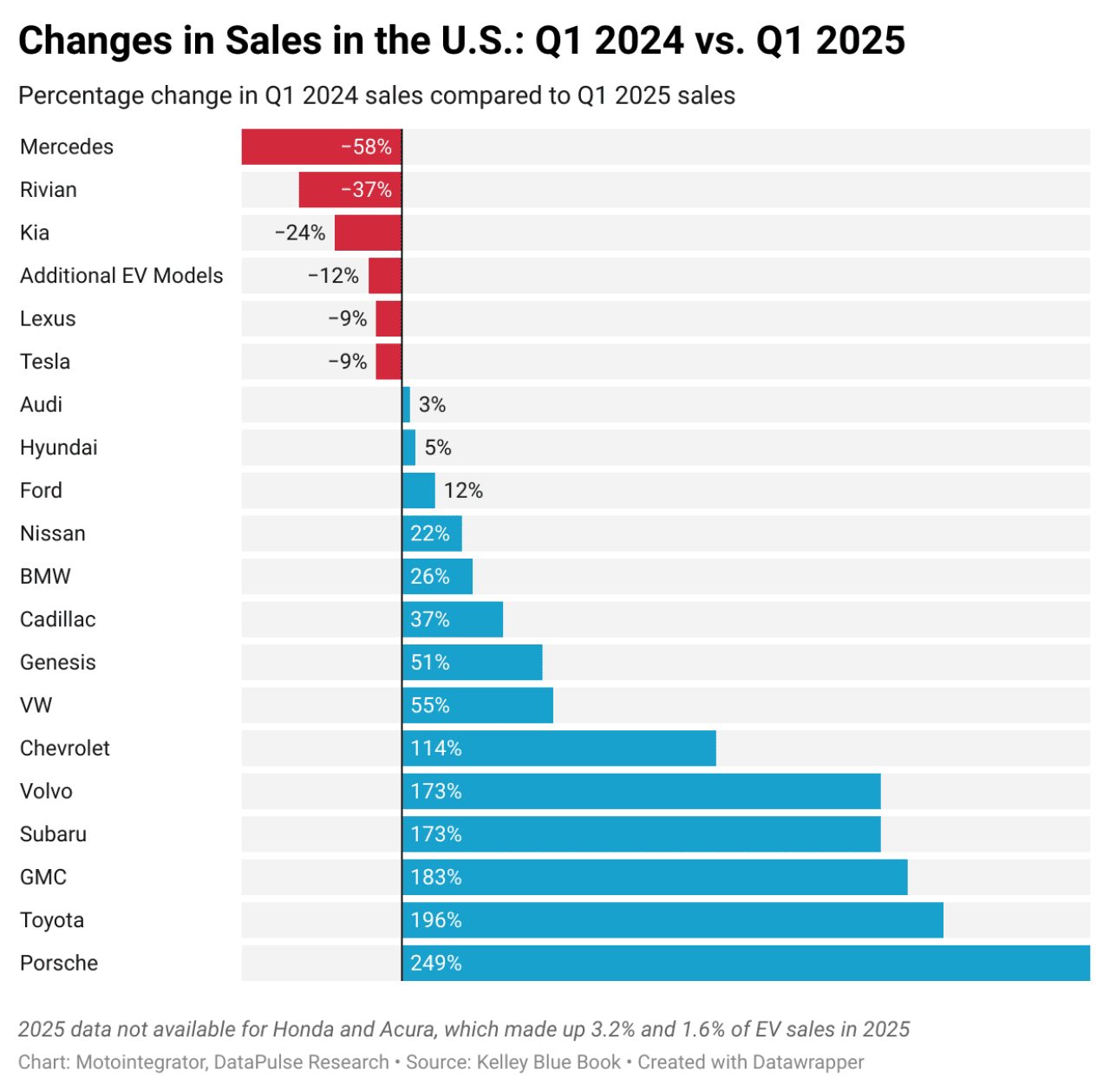
Motointegrator // DataPulse Research
Tesla’s Market Share and Financial Standing
Tesla’s grip on the U.S. EV market is loosening. In Q1 2025, its market share fell to 43.2%, down from 52.7% the previous year—a 9.5-point decline. No other automaker came close to this level of loss. While Tesla lost ground, Chevrolet gained 3.1 points, Toyota and Porsche each climbed by more than 1 point, and other brands like GMC, VW, and Subaru made notable gains.
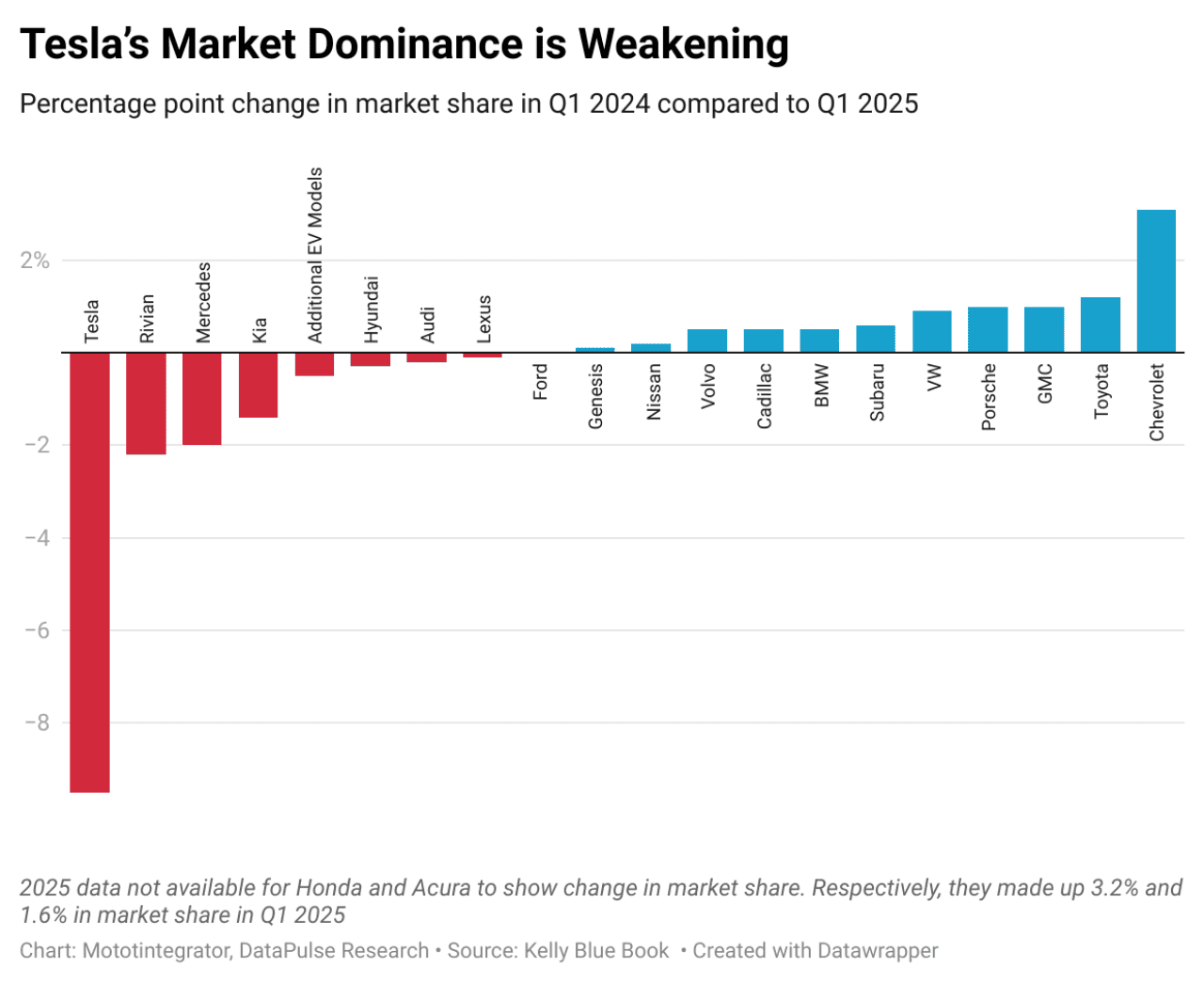
Motointegrator // DataPulse Research
Investors, expressing concerns about Musk’s divided focus, are taking notice. Tesla’s stock has experienced a significant decline, dropping approximately 46% from its peak of $479.86 on Dec. 17, 2024, to $284.82 by May 9, 2025. In the first quarter of 2025, Tesla reported a 71% decrease in net income, falling to $409 million, and a 9% drop in revenue to $19.3 billion. This downturn reflects growing reputational challenges. In the U.S., protests and boycotts have emerged, with movements like “Tesla Takedown” urging consumers to divest from the company.
Despite these issues, some investors remain optimistic about Tesla’s future, citing upcoming product launches like a more affordable EV model. However, the company’s ability to navigate political controversies, restore consumer trust, and maintain competitiveness in the rapidly evolving EV market remains to be seen.
Global Losses Reflect a Broader Shift
Tesla’s struggles are not limited to the U.S. The company’s European sales have dropped sharply in Q1 2025, despite surging EV demand. Competitors like Volkswagen, Renault, Ford, Citroën, and BYD more than doubled their registrations in February, leading to significant erosion of Tesla’s regional market share.
What is happening in Europe echoes the message from the U.S.: Tesla may not simply be lagging, it may be losing relevance among the very consumers driving the EV transition.

Motointegrator // DataPulse Research
American and European Consumers Have Soured on Musk
There are several factors driving Tesla’s decline, but consumer sentiment appears to play a key role. Recent U.S. public opinion polls underscore this point: Elon Musk’s approval ratings dropped sharply following his endorsement of Donald Trump in mid-2024. By early 2025, disapproval had overtaken approval.
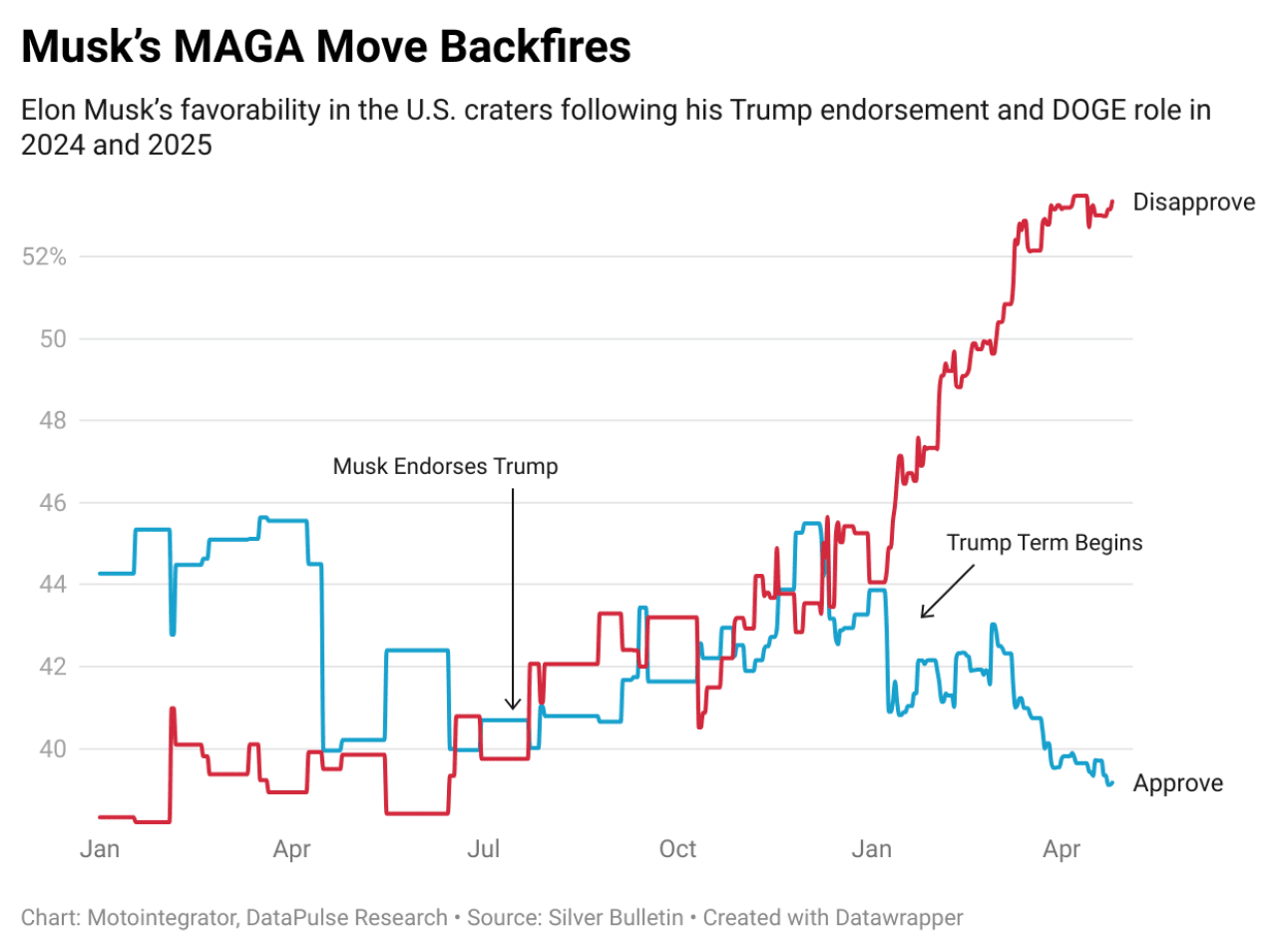
Motointegrator // DataPulse Research
A similarly recent YouGov poll showed Musk with near-universal name recognition (98%) but only 30% popularity—a sign that with fame comes not just visibility, but stronger opinions. This backlash mirrors European sentiments, where large majorities in Germany (73%) and the U.K. (69%) have labelled Musk’s insertion into politics as “unacceptable.”
Promise Made, Promises Kept—Musk’s Policy, Politics, and Economic Impact
Musk’s political role extends beyond public statements. As President Trump’s appointed head of the Department of Government Efficiency (DOGE), Musk argued that short-term hardship would lead to long-term prosperity.
In practice, however, DOGE policies have led to aggressive austerity measures. In March 2025, Challenger, Gray & Christmas reported 275,240 job cut announcements, with 216,670 directly attributed to DOGE actions—the third-highest monthly total in recorded U.S. history, surpassed only by the first two months of the COVID-19 crisis.
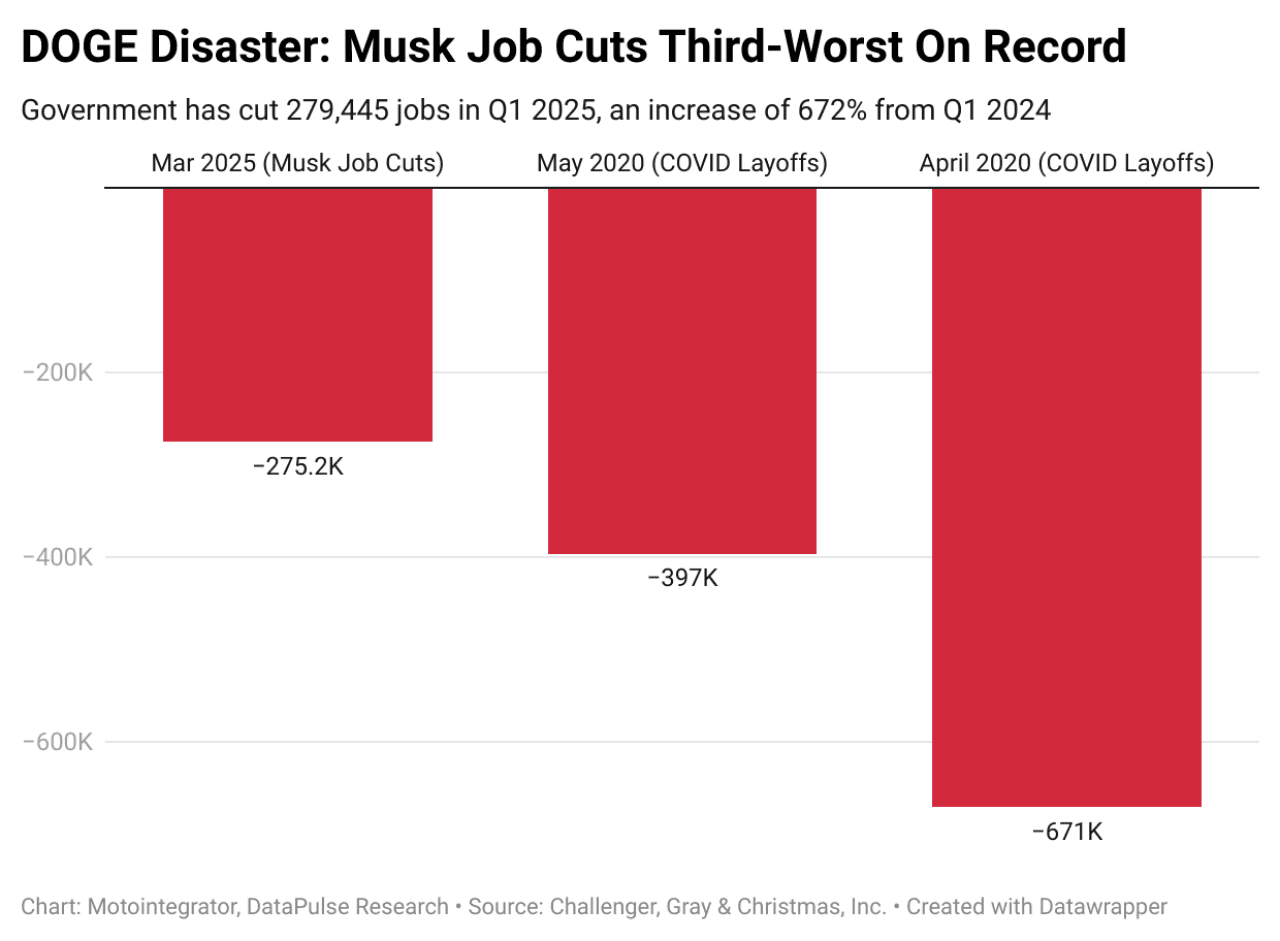
Motointegrator // DataPulse Research
Musk’s economic agenda is being felt at the household level. According to the University of Michigan’s Consumer Sentiment Index, consumer sentiment has cratered to levels not seen since the peak of post-pandemic inflation, reflecting deep anxiety among households about personal finances, business conditions, unemployment, and inflation.
Notably, the unease cuts across party lines. Since February, Republicans, Independents, and Democrats alike have reported worsening expectations for their finances, employment prospects, and the broader economy. With each new policy shift, consumers are bracing for more economic hardship.
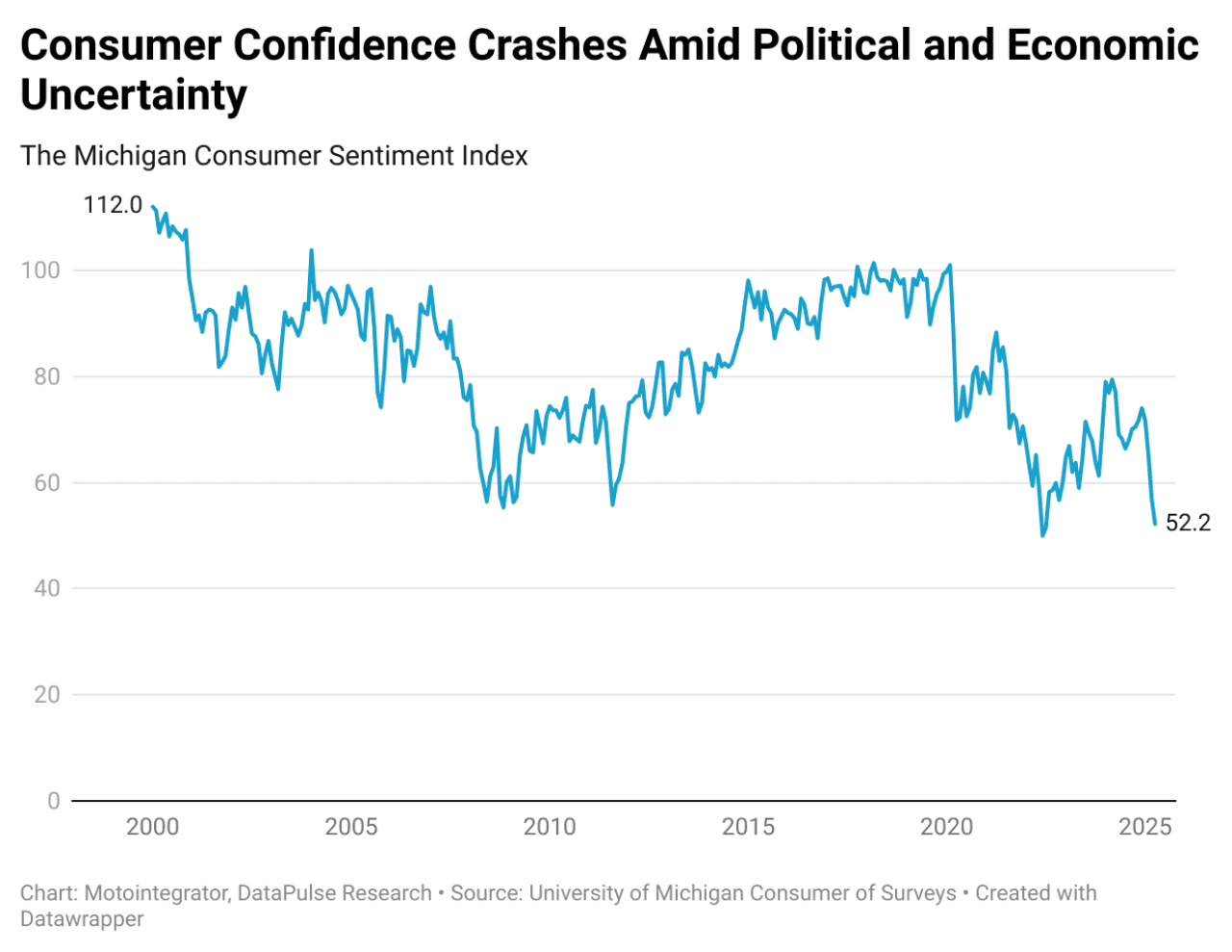
Motointegrator // DataPulse Research
Conclusion: Tesla at a Turning Point
In less than a year, Tesla has gone from market leader to cautionary tale, with falling sales, a loss of market share, and declining investor confidence both at home and abroad. What was once a brand synonymous with innovation is now inseparable from Elon Musk’s public profile as a powerful far-right political figure. If the first months of 2025 are any indication, Musk’s attempt to fuse corporate power with political authority may be backfiring: with consumers, markets, and even longtime fans turning away. The question now is not whether Tesla can regain ground—it is whether Musk can.
This story originally appeared on Motointegrator, was produced in collaboration with DataPulse Research, and was reviewed and distributed by Stacker.
![]()



